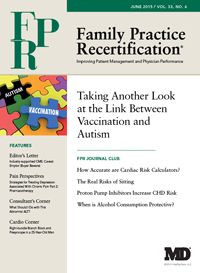Publication
Article
Family Practice Recertification
Proton Pump Inhibitors Increase CHD Risk
Author(s):
There is consistent observational data that identifies concomitant use of proton pump inhibitors for gastroesophageal reflux disease and clopidogrel following acute coronary syndrome increases the risk of recurrent cardiovascular events. While a variety of theories exist (lower pH alters absorption, etc.), no clear factor has been identified.
Review
Proton Pump Inhibitor Usage and the Risk of Myocardial Infarction in the General Population. PLoS ONE 10(6): e0124653. doi:10.1371/journal. pone.0124653
Study Methods
There is consistent observational data that identifies concomitant use of proton pump inhibitors (PPI’s) for gastroesophageal reflux disease (GERD) and clopidogrel following acute coronary syndrome increases the risk of recurrent cardiovascular events. While a variety of theories exist (lower pH alters absorption, etc.), no clear factor has been identified. This study used statistical “data mining” methods to determine if PPI use in patients without known heart disease (and not on clopidogrel) would be at increased risk for CHD outcomes.
Three databases were utilized for this study. They include the Stanford Translational Research Integrated Database Environment (STRIDE) which covers 1.8 million patients and over 19 million encounters, Practice Fusion, Inc. (PF), which is a free electronic health record covering 1.1 million patients and 5.5 million encounters and GenePAD (the Genetic Determinants of Peripheral Arterial Disease) which is a cohort of individuals with history of elective, non-emergent coronary angiogram for angina, shortness of breath or an abnormal stress test at Stanford University or Mount Sinai Medical Centers. The authors used a validated data mining process that evaluates the outcomes based upon a structured, algorithmic process where multiple variables can be included.
Results
Patients who carried the GERD diagnosis who received PPIs were found to have an increased adjusted Odds Ratio (AOR) = 1.16 (95% CI 1.09—1.24) for risk of myocardial infarction (MI). Concerning cardiovascular mortality, survival analysis found a doubling of risk (HR = 2.00; 95% CI 1.07–3.78; P = 0.031) associated with PPI use. This association persisted regardless of the patient’s clopidogrel use. On the other hand, use of H2 antagonists (ranitidine, etc.) were not associated with increased cardiovascular risks (AOR 0.93; 95% CI 0.86–1.02).
Conclusions
Proton Pump inhibitor use for GERD increases the risk for adverse cardiovascular outcomes, including a doubling of the risk of CV mortality. In contrast, histamine antagonists do not increase this risk.
Discussion
The second most commonly prescribed brand name drug in the US is esomeprazole (Nexium). This represents over 9 million prescriptions and costs over 6 billion dollars. On the generic side, the 6th most commonly prescribed medication is omeprazole (Prilosec) at over 53 million dollars in 2014. This does not include omeprazole’s over the counter sales. PPI’s are highly effective at relieving GERD symptoms, yet, they are commercially advertised to be used when eating spicy foods or large amounts of foods, the exact opposite of the lifestyle methods that are effective at controlling GERD symptoms.
This is a unique type of observational analysis where digital, de-identified data can be evaluated using sophisticated electronic methods. While not proving cause and effect, it does include a large number of patients and has the ability to include the variety of medications an individual is taking at one time more accurately than our current cohort methodologies. It was able to control for gender, ethnicity, concomitant drug use (including clopidogrel) and length of drug exposure.
The findings here are highly worrisome. For the largest data set (STRIDE), pantoprazole caused the greatest increase in risk, whereas esomeprazole provided a non-significant risk increase. Clearly, histamine antagonists were the safest. This dataset also includes patients at low cardiovascular risk who developed adverse CHD outcomes solely based upon the risk from their PPI use.
When you add myocardial infarction and CHD mortality to the other risks of chronic PPI use (diarrhea, pneumonia, accelerated osteoporosis vitamin B12 deficiency), it is important to recognize we are both the potential cause, and the solution to this problem.
With endoscopically proven erosive esophagitis, chronic PPI treatment is recommended as first line treatment
But for the vast majority of our patients with empirically diagnosed GERD, treat with 6-8 weeks of a PPI, then “step down” to the “lowest effective dosage of acid suppressant.” There are a variety of ways to step down when there has been successful treatment on the initial 6-8 weeks of PPI, including a step down to a once or BID dosing of an H2 antagonist (eg. Ranitidine 300 mg bid) for a 3-4 weeks, followed by a week of 300 mg once a day, then prn.)
All guidelines that address GERD make the mainstay of treatment the lifestyle interventions: stress reduction, alcohol and tobacco cessation, reduction in offending foods, etc. Keeping patients with empirically diagnosed GERD on a chronic PPI has significant dangers. Step them down today.






